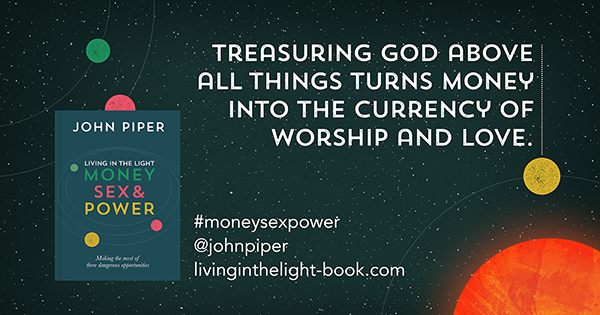Living in the Light: Money, Sex and Power by John Piper – A Review

Sometimes the impression can be given that Christians think money, sex, and power are inherently bad things. Perhaps it’s given when we have little to say to the Christian in a position of responsibility at work? Perhaps it’s given when sex is never mentioned from the pulpit, except when we’re saying what we’re against? Perhaps… well, maybe we could go on.
But in his new book, Living in the Light, John Piper is out to turn that misunderstanding on its head. In fact, he begins by stating his argument up front:
“God did not concieve and create money, sex, and power simply to be a temptation. … [They] are not detours on the path to God-exalting joy. Along with all the rest of God’s good world, they are the path. With them, we can show the supreme worth of God.”

In other words, money, sex, and power are God-given opportunities to “make God look really good”. When was the last time you thought about what you did with your wallet, your responsibilities, or even your relationships, as having that purpose? But once you think about it, of course it makes sense. How we handle money, sex, and power inevitably reveals what we value. And therefore there’s a way of engaging with them that shows we value God above everything else.
And yet, of course, that potential can be revealing too. In that sense Piper calls them “dangerous opportunities,” because how you treat these three “puts your heart’s treasure on display”:
“[Money, sex, and power] are ways of displaying God’s supreme worth in your life, or they are ways of displaying what you think is the supreme worth of something else.”
Really the book is framed around an extended analogy, with Piper suggesting we’d do well to think about our solar system as a picture of how we’re to relate to money, sex, and power. In and of themselves they’re good things that God has created, and as such we need them to be in their right place within God’s ordering of the world. The sun, the “blazing centre” of our solar system, is God. But the nature of sin is to place other things or desires, even God-given things like money, sex, and power, at the centre of our existence and identity, rather than seeing them as planets orbiting a sun.
If that’s the diagnosis, Piper’s way of putting the solution is that we return “God’s all-satisying glory” to the centre of our solar system. This is to live in the light. Only God’s glory has the gravitational attraction to hold those other things in their right place and orbit. Only God can hold our lives together. Only then do we discover what we were truly made for:
“…money exists so that it will be plain by the way we use it that God is more to be desired than money. Sex exists so that it will be plain that God is more to be desired than sex. And power exists so that it will be plain that admiring and depending on his power is more to be desired than exalting our own… we were created to glorify and thank God – that is, to treasure the glory of God over all things, to be amazed at his glory, to admire his beauty, to enjoy him and all his perfections, to be satisfied in him, and to find a deep, settled contentment in his all-satisying fellowship.”

It’s a powerful picture, but it’s biblically persuasive too. I appreciated how Piper unpacked the ‘exchange’ language of Romans chapter 1, showing how we turn from God’s glory and instead set significant things up as ultimate things in place of God. Of course, this is often because of what these things can do for us. As Piper puts it, they become “altars and incense in the temple of pride”.
But as we have our eyes opened to what Jesus has done in rescuing us, we become captivated by a greater glory – and this transforms us. This is where passages like 2 Corinthians ch3 are key, showing that discipleship involves an internal beholding of how amazing God is, as we’re changed from one degree of glory to the next. Piper then paints for us what this transformation might look like, as each of the planets returns to its proper orbit around our worship of the Son, to make “the whole system sing with joy”.
I found these examples and articulated thought-processes very helpful in considering what this would mean in my life. In particular, I felt I’d never really considered my relationship to power, so that was an eye-opener. A small critique would perhaps to have shifted the weight of the word count from earlier on in the book, and instead developed the latter section on ‘Deployment’ (i.e. application). In particular, I wonder if it would be an even stronger book had it engaged more with poverty and singleness. However, there are always limits and calls to make – so perhaps that’s a counsel of perfection.
For someone looking to press on as a follower of Christ, Living in the Light will be a fullsome and unshrinking read. In essence, it’s a worked example of how to make much of Jesus Christ with all of our lives. If you’ve never read any Piper, it’s a great way to begin. If you’re a JP junkie, you’ll still appreciate how he pushes seeing Christ as supreme into the specifics of our lives. And with its smart hard-back glossy finish and perspective-changing approach, it’s a fab investment. Why not pack it in the suitcase over the summer and spend some decent time mulling it over?
You can also check out the book’s mini-site, where you can read samples, sign-up for a free five-day email devotional, as well as order your own copy.
Disclaimer: The publisher has sent me a free copy of this book, but I hope this is still a fair and honest review.